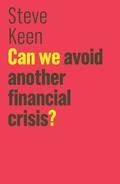Can We Avoid Another Financial Crisis?
Blackwell Companions to History

1. Auflage April 2017
140 Seiten, Softcover
Wiley & Sons Ltd
Kurzbeschreibung
The Great Financial Crash had cataclysmic effects on the global economy, and took conventional economists completely by surprise. Many leading commentators declared shortly before the crisis that the magical recipe for eternal stability had been found. Less than a year later, the biggest economic crisis since the Great Depression erupted.
In this explosive book, Steve Keen, one of the very few economists who anticipated the crash, shows why the self-declared experts were wrong and how ever-rising levels of private debt make another financial crisis almost inevitable unless politicians tackle the real dynamics causing financial instability. He also identifies the economies that have become 'The Walking Dead of Debt', and those that are next in line - including Australia, Belgium, China, Canada and South Korea.
A major intervention by a fearlessly iconoclastic figure, this book is essential reading for anyone who wants to understand the true nature of the global economic system.
The Great Financial Crash had cataclysmic effects on the global economy, and took conventional economists completely by surprise. Many leading commentators declared shortly before the crisis that the magical recipe for eternal stability had been found. Less than a year later, the biggest economic crisis since the Great Depression erupted.
In this explosive book, Steve Keen, one of the very few economists who anticipated the crash, shows why the self-declared experts were wrong and how ever-rising levels of private debt make another financial crisis almost inevitable unless politicians tackle the real dynamics causing financial instability. He also identifies the economies that have become 'The Walking Dead of Debt', and those that are next in line - including Australia, Belgium, China, Canada and South Korea.
A major intervention by a fearlessly iconoclastic figure, this book is essential reading for anyone who wants to understand the true nature of the global economic system.
List of Tables and Figures
1. From Triumph to Crisis in Economics
2. Microeconomics, Macroeconomics and Complexity
3. The Lull and The Storm
4. The Smoking Gun of Credit
5. The Political Economy of Private Debt
6. A Cynic's Conclusion
Endnotes
Bibliography
Yanis Varoufakis, former Finance Minister of Greece
"In this compelling essay, Steve Keen shows that the "Great Moderation" was in fact a great delusion and documents, to brutal effect, the foolish complacency of mainstream macroeconomists."
James K. Galbraith, University of Texas at Austin
"Steve Keen explains why the financial crisis it occurred, and why it can't just get better on its own, along its present track. He also explains - in a hilarious and absolutely justified takedown - why mainstream economists have a "trained incapacity" in being unable to understand why the economy has broken down - and hence, why they don't have a real solution. We are still living in the aftermath of the 2008 crisis. It's all about debt. But economists fear they will lose their jobs if they say that debts must be written down. Keen asks what is more important: to save the economy, or to save the jobs for economists whose prestige rests on their not understanding why economies are in trouble today."
Michael Hudson, author of Killing the Host and The Bubble and Beyond


